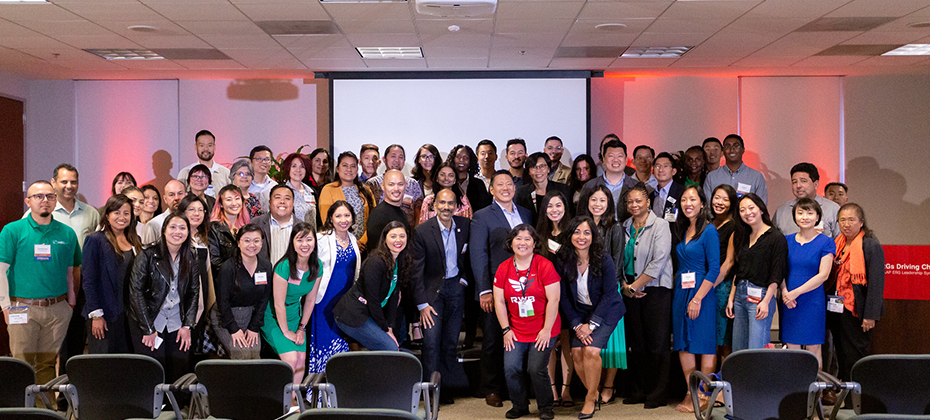Experian Stories
The #ExperianStories series features ways our innovative employees from around the world are improving our world.

October marked Black History Month (UK) – a celebration of the culture, heritage and achievements of Black people past and present. Although we weren’t able to celebrate in person this year, our Black at Experian employee network were still able to serve up an incredible range of inspiring webinars, videos, articles and podcasts covering topics discussing Black British culture, ways to discuss race and racism with our children, as well as the importance of being an ally. This exciting schedule of activities has been the perfect opportunity to learn more and many of us were personally touched by the stories of our Black colleagues who have openly and courageously shared their thoughts and experiences with us all. But as Black History Month comes to an end for another year, it’s essential that our support doesn’t stop here. As an organisation, we are committed to promoting equality and diversity for all. And our Black at Experian network has already been instrumental in helping us understand how we can improve in some of these areas. Part of this includes signing the Business in the Community (BITC) ‘Race at Work Charter’. By working alongside BITC, as well as our other employee networks, it's helping us create initiatives that will continue to drive positive change and inclusion for all. We are committed more than ever to leverage our differences as individuals and use this broad range of talents to develop our competitive advantage as a business. We’ve made good progress in a short space of time, but this is just the beginning. We are looking forward to continuing this important journey in building a workplace that embraces a more diverse and inclusive culture.

02 November 2020 is a day we’re really proud of at Experian – our Danish Credit Bureau turns 150 years old! As we prepared to celebrate this milestone with our people, our customers and all our wider stakeholders, we delved into our archives. We found extraordinary pieces of our history that still resonate with us, with how we do business, today. On this historic day, it’s my pleasure to share some of these here. In 1783, a Danish merchant wrote a polite request to a potential customer who was asking for credit to provide information about their circumstances rather than their “Happiness and Piousness”. It’s the earliest example we have of a credit check. Businesses still need that information today, and it’s a demand Experian helps meet globally every day. Købmandstandens Oplysningsbureau, or KOB, is a name that still appears on Experian products. Evidence of not only offering data and information services that meet businesses and consumers’ needs, but being a trusted provider of accurate data and information. We continue to publish a quarterly analysis of start-ups across industries in the Nordics, which started when we first printed a solvency book in 1930. In 1928, KOB had a woman on its Board of Directors. Mrs M C Gazette served alongside three men, and during her tenure created the Gazette Fund, a hardship fund to which employees could apply in times of need. The fund ran until 2016, when it moved to a different structure for fiscal reasons. In 1938, the German Information Agencies demanded the names of Danish businessmen of Jewish descent be given to them. We uncovered a news article from 1945 showing our Chairman rejected this demand, safeguarding the trust those consumers placed in our business, and morally doing the right thing. Both actions by former Board members exemplify principles we continue to hold dear at Experian today. Operating in the Experian way, we safeguard the information we hold, we embrace diversity, are inclusive, and strive to ensure all our people feel free to bring their whole and unique self to work at our Company, contributing to our high performance culture. What is clear from these examples and others in this celebratory digital storybook published today, is data has been at the heart of all we do for 150 years, and it will continue to be in future. From the early days, when we helped Danish businesses assess creditworthiness of their customers, through to today, we’re still empowering businesses and consumers to manage their data with confidence. We’re grateful for the many years our customers have trusted us to provide them with data and insights that help their businesses to thrive. We’re proud of our employees in the past, and those we have with us today. As a team, we work daily to value each other, safeguard our future and delight our customers. It has been an exciting journey, and we have only just begun. We are investing in the future, through new technology, talented people and innovative solutions that power opportunities that create a better tomorrow for our employees, our customers, consumers and the communities in which we operate. We’re celebrating today, and we’re excited about the opportunities ahead of us too.

Today kicks off Asian Pacific American Heritage Month. The Experian Asian American Employee Resource Group (ERG) is proud to recognize this special month by sharing how Experian is supporting a national campaign to address the adversity facing some of our most at-risk communities right now. Experian has joined ten non-profits and more than 80 companies from across industries and sectors nationally to support the #AscendTogether action agenda. It includes promoting inclusion, raising awareness of vulnerable groups, denouncing bias, supporting frontline healthcare workers, COVID-19 victims and families, and donating funds and resources to support vulnerable populations and impacted businesses. Led by Pan-Asian leadership nonprofit Ascend, this effort is designed to bring about unity at a time when fear about COVID-19 has led to rise of intolerance and racist acts, particularly against the Asian and Asian-American community. Experian is proud to step up as a leader in our industry to participate in this effort. As executive co-sponsors of Experian’s Asian American ERG, we hope you will join us in our efforts to be a champion for diverse communities, especially during this time. You can learn more about #AscendTogether here. Written by: Dacy Yee, Chief Customer Officer ECS Direct-to-Consumer and Jimmy Cheung, Senior Vice President of Technology and Engineering

In the United States, June is observed as Pride Month by the Lesbian, Gay, Bisexual, Transgender and Queer (LGTBQ+) community. The celebration is in remembrance of the 1969 Stonewall Uprising in Manhattan, a tipping point for the Gay Liberation Movement in the U.S. Pride is not only about the parades and flags, but about the celebration and commemoration of the contributions members of the LGBTQ+ community have made throughout U.S. history—and there are many. Though the beginnings of Pride Month originate in the U.S., Experian is committed to supporting and uplifting the LGBTQ+ community on a global scale. This year was an especially important year, marking both the 50th anniversary of the Stonewall Uprising and the one year anniversary of the inception of Experian’s Pride Network Employee Resource Group (ERG). Our Pride Network executive co-sponsors, Michele Bodda and Todd Rudie, say, "As our culture continues to evolve, we feel especially empowered by Experian’s demonstrated commitment to diversity and inclusion. With great support from our leadership, we launched the Experian Pride Network just one year ago and have achieved success beyond our aspirations." Earlier this year, for example, Experian earned a "2019 Best Place to Work for LGBTQ Equality" designation by the Human Rights Campaign (HRC). "We are proud to have achieved a perfect score on our very first submission to HRC’s Corporate Equality Index. This was a goal our ERG originally set out to achieve within three years," Bodda and Rudie stated. With so much to commemorate and celebrate, our Pride Network kicked off the month with numerous events around the world, including participation in official Pride parades, on-campus barbecues, bake-offs, spirit days, LGBTQ-focused webinars and so much more. It's important for us to not only provide a safe space for members of the LGBTQ+ community, but to also educate all of our non-LGBTQ employees about how they can be better allies. As part of the festivities, we had The LGBT Center OC conduct a webinar for ways we can develop tools and strategies for good allyship across the LGBTQ+ community and beyond. Here are some takeaways of what it means to be an LGBTQ+ ally: Allies have a deep understanding of LGBTQ+ people, terms, and experiences Allies speak up when they see discriminatory behavior Allies intervene in cases of bullying or harassment Allies always use the right name and pronouns for their transgender friends Allies recognize that they have privilege over other marginalized groups, and they want to use that privilege to help elevate the voices of the unheard Experian also hosted a webinar on navigating the workplace as a transgender individual. While several states have laws in place to protect transgender and gender non-conforming individuals in the workplace, harassment and discrimination are still large issues in the U.S. today. Here are some takeaways of what we can do to better support our transgender and gender non-conforming colleagues and friends: Understand the biases and hardships trans and gender non-conforming individuals face in the workplace — 75 percent of transgender workers experience discrimination, harassment, bullying, privacy invasion and suppression every day at work Know the laws in your state Empathize. You can do this by calling people by the preferred name/pronoun, refraining from making assumptions about others' sexual orientations and avoiding making assumptions that all trans people look the same or are going through a "transition" Be an ally — add gender neutral/all-gender restroom options, normalize the usage of pronouns, don't ask personal or inappropriate questions, etc. After taking measures to further educate ourselves, it was time to celebrate! Here are some photos from our Pride celebrations: Costa Mesa, CA Allen, TX Schaumburg, IL Clearwater, FL Costa Rica

As part of Experian’s commitment to the value of Employee Resource Groups (ERG), we recently hosted the National Association of Asian American Professionals (NAAAP) ERG Leadership Symposium, ERGs Driving Change at our Costa Mesa headquarters. ERGs are a proven strategy for organizations to advance a diverse and inclusive company culture. At Experian, we believe the culture of inclusion also cultivates and advances innovation with the added diversity perspective that strengthens the community of professionals and ideas within the company. We were proud to host the 13th ERG one-day training program that was organized by the NAAAP to help companies and employees advance their ERG experience and learn how ERGs are change agents to enhance productivity and grow professional networks in the corporate setting. Speakers represented companies leading their industry, such as Bank of the West, Macy’s, Anheuser-Busch, Google, Facebook, UPS, Northrop Grumman, Boston Scientific, and many more, including Experian. The symposium this year featured numerous ERG thought leaders sharing their insights across a variety of sessions and panels, including; Best Practices in Demonstrating Value, Creating Connections through ERG Leadership, What’s Next Action Plans for Your ERG, among others. Caption: Hiq Lee, President, Business Information Services for Experian, shared insights as a panelist for The Crucial Executive Role in Driving Change session. She was joined by Judy Ting, SVP, Pacific Rim Region Manager, Bank of the West, and DeAnne Aussem, Managing Director & Founder of U.S. Leadership Coaching Center of Excellence, PricewaterhouseCoopers, LLC. The panel was moderated by Farzana Nayani, NAAAP ERG Architect. All speakers provided valuable takeaways for the professionals in attendance to motivate their organizations to positively impact their company with the diversity amongst its workforce and implement strategies to leverage the power of inclusion. Specifically, the hundred-plus attendees learned more about how Employee Resource Groups and Business Resource Groups are change agents for diversity, inclusion, engagement, productivity, and connection-building within organizational settings. Justin Hastings, former Chief Human Resources Officer for Experian North America, welcomed the ERG Leadership Symposium attendees with his introductory remarks, as he shared Experian’s perspective on inclusion leading to innovation. Therefore, we asked him some questions to share his insights with us on Experian’s ERGs. 1. How is Experian creating a better tomorrow? Hastings: The consumer is at the heart of everything we do. Our product innovation is geared towards giving consumers more control over how their data can enrich their lives. Experian Boost is a perfect example of this coming to life. Inclusion underpins our ability to innovate. The more we encourage a culture where everyone’s creativity is valued, the more we are able to innovate for consumers. Our ERGs play an important role in promoting diversity, and creating an environment where all our Experian people can bring their whole selves to work and be creative. 2. What role does The Power of YOU have in Employee Resource Groups? Hastings: We created a workplace environment where everyone is comfortable bringing their whole self to work, regardless of differences or backgrounds. We call this The Power of YOU, which creates an environment for employees to be their true selves. We advance our company culture by not only respecting the differences amongst Experian colleagues, but actively celebrating them with and through our ERGs. 3. What impact does the Employee Resource Groups have on Experian? Hastings: At Experian, inclusion is vital to the success of the company. Our ERGs provide us with a platform to be a more innovative business. Our ERGs now have around 1,000 employees actively involved across the eight current groups. They have helped create greater understanding of different cultures that are represented in our company, and they have also underpinned our recruiting efforts across diverse talent pools. This has helped us to keep evolving our employee base to be increasingly representative of the communities in which we operate, and the consumers we ultimately serve. Learn more about Experian’s Employee Resource Groups by visiting: https://www.experian.com/corporate/power-of-you.html Learn more about the National Association of Asian American Professionals (NAAAP) by visiting: https://www.naaap.org/ All photos taken by Nhan T. Nguyen.

As any new employee knows, it takes time to adapt to a new company and set of coworkers. I recently joined Experian’s team of 56 employees in the Netherlands office after hearing about the company’s inspiring work in the community. I was eager to get to know each colleague outside of our daily tasks so I could learn what type of CSR projects could work for our office. Luckily, I arrived just in time to participate in a new volunteer partnership with Stichting Present. Stichting Present is an organization that facilitates volunteering programs to support those facing poverty, poor health and social isolation. This new partnership gave my coworkers and I the opportunity to volunteer in the community. During last year’s holiday season, the Experian team collected personal hygiene items such as shampoo and body wash to donate to homeless individuals or those with mental health issues. This past spring, we spent two full days doing renovations for Stichting Leren Doen, a program that teaches at-risk students how to fix and sell bicycles. The students’ program was, by coincidence, moving into Experian’s old office building, so my coworkers and I helped give the place a makeover – we put in new floors, painted the walls, stairs and desks, installed new computers and completed some electricity work. Working together as a team helped us connect on a deeper level as we served those in need. These experiences have given me the opportunity to get to know and appreciate my colleagues better. For example, during the project, I learned that two of my colleagues had bonded with a young woman with autism who was the only female student of Stichting Leren Doen. Although the young woman was reserved at first, she eventually opened up and mentioned that she walked three hours to and from school every day. My colleagues were surprised by this admission and informed the director of the program. Since Stichting Leren Doen is a bike repair education program, the director presented her with a new bike to help shorten her commute. Her face lit up – she loved it. I cannot imagine a more fitting welcome to Experian. Opportunities like these are exactly why I joined the firm and why I am excited for the opportunities ahead. Giving back to the community is a big passion of mine, and I cannot wait to spend more time volunteering and getting to know my colleagues. Naomi Hardeveld HR Business Partner, Netherlands

In the United Kingdom, the Financial Inclusion Commission has previously expressed concern that 31 percent of the adult population has experienced one or more signs of financial distress, such as regularly accruing overdraft charges and using credit to pay for essentials each month. While the Bank of England has warned U.K. households about the risk and effects of their alarming, yet growing, dependence on loans and credit cards, knowing how to manage debt successfully is a vital skill many lack. While most individuals do comfortably manage their debt repayments, many unexpectedly face tough times, especially following disruptive life events that complicate financial management. Since joining Experian from university in 1992, I have been involved in a number of developments and initiatives to help people better manage their money, particularly during difficult times. Years ago, I oversaw the launch of our first telephone helpdesk for the UK public, and today I still answer questions online and occasionally on the radio from individuals worried about their credit scores and loan payments. After years of one-on-one interactions, my team and I have discovered that the key to growing our capacity to serve the community is through partnerships. To provide more effective support for U.K. consumers, Experian began to partner with debt advice charities that give free and professional guidance to people, including about credit score issues. Experian’s role is to make sure debt advisors understand the nuances of credit reporting and credit scoring when talking to and helping their clients. We provide this support in a number of ways. In the last year alone, we have trained more than 600 debt advisors through workshops and seminars, and provided free credit reports to more than 60,000 individuals through debt counselling outlets. Additionally, we have used our insight and data consultancy services to help a number of charities better understand, engage with and support their clients, for example, by identifying their clients’ preferred communications channels. This has included the Money Advice Trust, which runs National Debtline, and StepChange Debt Charity, a leading UK debt counselling provider. Our partnerships within the debt advice sector have not only enabled us to support, educate and empower more consumers to reach their financial goals, but also helped Experian better understand consumers’ greatest fears and misconceptions when it comes to finances. I have enjoyed representing Experian for the past 25 years including working with a number of great organizations and really passionate individuals – so much so that I jumped at the opportunity to join the board of a new debt advice charity, The Debt Counsellors Charitable Trust, a couple of years ago which was very much focused on helping the most vulnerable people. The relationships I’ve developed with these intelligent, ambitious debt advice advisors and charities has really inspired and humbled me. They work tirelessly every day to ensure households in the U.K. can reach their financial milestones – including, importantly, when things go wrong – and I am grateful to be a part of this important network. James Jones: Head of Consumer Affairs, U.K.

I feel that part of Experian’s responsibility as a global information services company is to build and bolster community involvement initiatives that help others. I’m currently a manager of our Fraud Resolution Team and Credit Educator Department in Allen, Texas, but I also have the honor of managing all outreach programs for our branch, bringing together Experian employees to give back to the community. Taking on a volunteer project on top of regular work can be daunting. As the point person for my office’s volunteerism, I’m in charge of communications about upcoming events and drumming up interest and excitement among employees, be it through flyers, silly videos, emails or even free t-shirts. I know a lot of my fellow employees, but I don’t know everyone, so spreading the word isn’t always easy. Despite these challenges, I continue doing this important work because I care about the impact Experian makes in its local communities. My first volunteer experience with Experian was working alongside Stop Hunger Now – an international hunger relief nonprofit – several years ago. I was amazed at the impact we had. Shortly thereafter, I also participated in a canned food drive, rallying Experian employees to visit the Texas Food Bank. After these two chaotic, inspirational, behind-the-scenes experiences, my interest was permanently piqued in on-site volunteer days within the Allen community. Since then, I’ve organized volunteer days with many other nonprofit programs. The amount of organization and work that goes into each volunteer day is much more than you might think. For every Stop Hunger Now event, we package 10,000 meals for those in need, which requires about 100 volunteers dedicating their time. When we worked with Habitat for Humanity, a nonprofit organization devoted to building homes for those who need them, our first two scheduled events were rained out – and it never rains in Texas! I was worried that no one would show up the third time, when we had to reschedule for 7 a.m. on a Saturday. Luckily, every single volunteer spot was filled. We got to meet the family we were building a house for, and we all signed a piece of wood from the house for them. Their gratitude made all the frustration and extra work worth it. It takes a village to get some of these events off the ground, but I have a strong support structure at Experian. And learning to empathize with people through volunteering helps me in my day-to-day work. People who are dealing with fraud can be very emotional, and fraud is unexpected by nature. My volunteering experience has equipped me with the skills needed to empathize with others better and think on my feet.

Real stories about helping people, businesses and society as told by Experian employees around the world. It’s a simple concept and, as the first year of our #ExperianStories series showed, a powerful one as well. What began as a call to action in support of our global brand refresh last January has become an employee-driven chronicle of our ongoing journey as a company. These stories tell how employees are helping more people access the financial services they need, helping them protect their identities, and how we are making a difference in our communities. A new Experian story is added here to the Experian Global News Blog site every few weeks and shared via social media channels like Facebook, Twitter and LinkedIn. Below is a sampling from the more than 40 #ExperianStories employees have contributed so far: In India, we shared how we are using biometrics to help people with thin credit files, including those in rural areas with little or no formal identification, to prove their identities and secure the loans they need. In the U.K., one of our data scientists told how her own educational and professional journey gave her the passion to help more girls explore a STEM education. As she puts it, “No one should have to automatically rule them out of a career path based on gender.” In Brazil, we are addressing fraud by working with financial technology (fintech) organizations, including online lenders, to overcome the high fraud rate in Brazil to “help the right people to get the money they need at a fair price, faster.” It’s been a year since we started sharing our #ExperianStories and we’ve reached 20 million people so far. Given what our company is doing and the innovative approaches to solving society’s problems, this second year promises to be every bit as informative and impactful. And beyond the stories themselves, I am equally proud of how our employees are making a difference and how they work every single day to use data, analytics and technology to help improve lives around the world. Stories matter. Our employees matter. And the work they are doing makes a difference. I hope you continue to join us on our #ExperianStories journey.